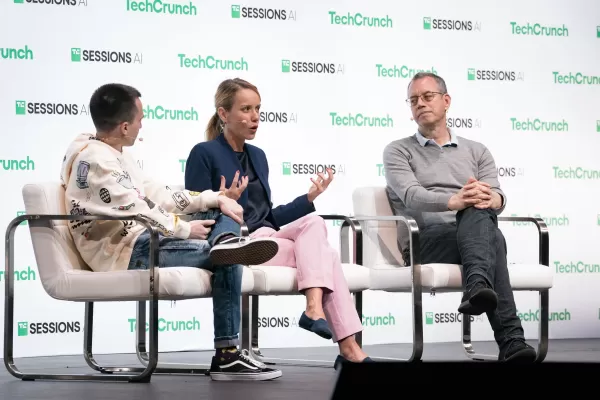AI Goes Undercover at Work in 2025, Deloitte's Tech Trends Report Reveals

Every year, Deloitte's Tech Trends report dives deep into the technological landscape of the past year and highlights the macro industry trends that will shape digital transformation over the next 18 to 24 months. This year's report, released today, once again spotlighted artificial intelligence (AI), but with a twist from previous years.
Despite AI remaining as popular as ever since its surge in interest two years ago, the industry has seen notable shifts in how technology is perceived, adapted, and implemented by both consumers and organizations. According to the report, AI is "being woven into the fabric of our lives."
Mike Bechtel, Deloitte's chief futurist and a co-author of the report, likened AI to essential technologies like electricity or the World Wide Web—things we rely on daily without much thought. He noted that AI is increasingly becoming an underlying layer for key business operations.
"The difference between the next 18 to 24 months and the last 18 to 24 months is that AI is moving undercover," Bechtel explained. "It's becoming the foundation or sub-structure of all the other business-oriented things that we need to do and think about."
As AI becomes integral to nearly all business operations, the initial apprehension about the technology is diminishing. Business leaders are now shifting their focus from whether to adopt AI to how they can best leverage it, exploring options like hardware upgrades, small language models (SLMs), agentic AI, and more.
AI in Business: A Team of Specialized Agents
When AI chatbots like ChatGPT burst onto the scene, the large language models (LLMs) behind them were quickly sought after to streamline business operations. Initially, the idea was to have one versatile chatbot capable of handling everything.
"For the last two years, it felt like AI was a monolithic thing—one chat window for all of our needs and curiosities," Bechtel said. "Now, we're seeing a fractal explosion where it's going to be AIs (plural), with dozens, then hundreds, and eventually thousands of domain-specific agents trained on domain-specific data."
The report highlights that SLMs, due to their flexibility, can be tailored to perform specific tasks such as applying for grants, delivering financial reports, or summarizing inspection reports—tasks where training an LLM would be inefficient.
These SLMs can work together, forming a team of virtual assistants that organizations can rely on for various tasks. This approach mirrors the way we use apps today, leading to the notion that 'There's an agent for that.'
"It's less of a single super suit; it's more like a posse, an Avengers team, if you will, of specially powered agents with specialized superpowers that you call on for special needs," Bechtel remarked.
SLMs also offer additional benefits: they can run on-device, are more cost-efficient, require less data, and are often open-sourced.
AI in Hardware
Over the past year, there's been a surge in AI-centric hardware with enhanced computational power, capable of running AI applications on-device and integrating AI features and workflows.
"An enterprise and employee physical computer refresh is about to start, the likes of which we haven't seen in 15 years," Bechtel stated. "For the first time in a generation, physical kit—processors, servers, networking, laptops—can be the key between getting to the future you want and being stuck in the past."
This trend is pushing companies to upgrade their employees' devices, as the envisioned AI transformation cannot be achieved without the right hardware support.
The report identifies this shift as one of its six trends, dubbing it "Hardware is eating the world." A prime example is Nvidia's skyrocketing popularity, with its GPUs becoming highly sought after, positioning the company among the world's most valuable firms. Deloitte forecasts that the global AI chip market will grow from $50 billion in 2024 to $110 billion in 2027 in a conservative estimate, or up to $400 billion in an optimistic scenario.
When it comes to deciding when to invest in hardware upgrades, Bechtel advises to "lead with need." He said, "If you have a set of strategic capabilities that you're champing at the bit to deliver and your hardware estate is your limiting reagent, then, by all means, it's time. If you're window shopping sparkly hardware just because it's sparkly, that might not be the most value-added decision."
Getting Started with AI
Despite the evolving AI landscape since 2023, the starting point for businesses remains the same: data. Whether a company is interested in using an LLM or SLM, having clean, organized, and up-to-date data is crucial for achieving accurate results.
"I think recommendation number one that I give to all my clients in every sector and every geography is to clean and normalize and govern your individual data sets before you think of dumping them into an AI," Bechtel advised.
He noted that about three-quarters of his clients initially come to meetings wanting an AI project but leave realizing they need a data management and governance project first.
To prevent the "garbage in, garbage squared" scenario, the report emphasizes that data-labeling costs are a significant driver of AI investment. Additionally, Deloitte's 2024 State of Generative AI in the Enterprise Q3 report found that 75% of surveyed organizations have increased their investments in data cycle management due to generative AI.
"When you look at the word 'IT,' you tend to think of the T, like, 'oh, technology shiny,' but the information piece is easily half of the game," Bechtel concluded.
Related article
 Mariah Carey and Michael Jackson Unite in Stunning AI-Generated Duet
The Future of Music Collaboration: Mariah Carey and Michael Jackson's AI-Generated DuetPicture two legendary voices coming together in perfect harmony - Mariah Carey's breathtaking five-octave range blending seamlessly with Michael Jackson's iconic v
Mariah Carey and Michael Jackson Unite in Stunning AI-Generated Duet
The Future of Music Collaboration: Mariah Carey and Michael Jackson's AI-Generated DuetPicture two legendary voices coming together in perfect harmony - Mariah Carey's breathtaking five-octave range blending seamlessly with Michael Jackson's iconic v
 Dundundance: The Viral Dance Trend Taking Over Social Media
Have you discovered the internet's latest dance obsession that's equal parts hilarious and absolutely addictive? Meet Dundundance - the viral sensation that's not just about steps, but about unleashing pure joy through movement. This global phenomeno
Dundundance: The Viral Dance Trend Taking Over Social Media
Have you discovered the internet's latest dance obsession that's equal parts hilarious and absolutely addictive? Meet Dundundance - the viral sensation that's not just about steps, but about unleashing pure joy through movement. This global phenomeno
 "Exploring AI Safety & Ethics: Insights from Databricks and ElevenLabs Experts"
As generative AI becomes increasingly affordable and widespread, ethical considerations and security measures have taken center stage. ElevenLabs' AI Safety Lead Artemis Seaford and Databricks co-creator Ion Stoica participated in an insightful dia
Comments (9)
0/200
"Exploring AI Safety & Ethics: Insights from Databricks and ElevenLabs Experts"
As generative AI becomes increasingly affordable and widespread, ethical considerations and security measures have taken center stage. ElevenLabs' AI Safety Lead Artemis Seaford and Databricks co-creator Ion Stoica participated in an insightful dia
Comments (9)
0/200
![HenryBrown]() HenryBrown
HenryBrown
 September 13, 2025 at 4:30:40 PM EDT
September 13, 2025 at 4:30:40 PM EDT
C'est fascinant de voir comment l'IA s'insinue discrètement dans nos vies professionnelles sans qu'on s'en rende compte ! 😮 Deloitte a encore frappé avec ce rapport, mais est-ce qu'on sera vraiment prêts en 2025 pour ces changements invisibles ? Ça me fait un peu peur... mais aussi super curieux !


 0
0
![RobertLewis]() RobertLewis
RobertLewis
 August 20, 2025 at 3:01:24 PM EDT
August 20, 2025 at 3:01:24 PM EDT
AI sneaking into workplaces like a secret agent? Deloitte’s report is wild! 🤯 I’m curious how these AI tools will change office vibes—more efficiency or just more chaos?


 0
0
![ElijahCollins]() ElijahCollins
ElijahCollins
 August 5, 2025 at 1:01:00 PM EDT
August 5, 2025 at 1:01:00 PM EDT
This Deloitte report on AI sneaking into workplaces is wild! 🤯 It’s like AI’s playing spy, quietly reshaping jobs. I wonder how many tasks it’ll take over before we notice?


 0
0
![EricMartin]() EricMartin
EricMartin
 July 29, 2025 at 8:25:16 AM EDT
July 29, 2025 at 8:25:16 AM EDT
This AI undercover stuff sounds wild! 😮 It's like having a secret agent in the office, but instead of spying, it’s boosting productivity. Wonder how long till we’re all just chilling while AI does the heavy lifting?


 0
0
![DouglasMitchell]() DouglasMitchell
DouglasMitchell
 May 6, 2025 at 10:41:08 AM EDT
May 6, 2025 at 10:41:08 AM EDT
¡Qué locura que la IA se cuele en el trabajo! 🧑💻 Me parece súper innovador, pero ojalá no termine reemplazando el toque humano.


 0
0

Every year, Deloitte's Tech Trends report dives deep into the technological landscape of the past year and highlights the macro industry trends that will shape digital transformation over the next 18 to 24 months. This year's report, released today, once again spotlighted artificial intelligence (AI), but with a twist from previous years.
Despite AI remaining as popular as ever since its surge in interest two years ago, the industry has seen notable shifts in how technology is perceived, adapted, and implemented by both consumers and organizations. According to the report, AI is "being woven into the fabric of our lives."
Mike Bechtel, Deloitte's chief futurist and a co-author of the report, likened AI to essential technologies like electricity or the World Wide Web—things we rely on daily without much thought. He noted that AI is increasingly becoming an underlying layer for key business operations.
"The difference between the next 18 to 24 months and the last 18 to 24 months is that AI is moving undercover," Bechtel explained. "It's becoming the foundation or sub-structure of all the other business-oriented things that we need to do and think about."
As AI becomes integral to nearly all business operations, the initial apprehension about the technology is diminishing. Business leaders are now shifting their focus from whether to adopt AI to how they can best leverage it, exploring options like hardware upgrades, small language models (SLMs), agentic AI, and more.
AI in Business: A Team of Specialized Agents
When AI chatbots like ChatGPT burst onto the scene, the large language models (LLMs) behind them were quickly sought after to streamline business operations. Initially, the idea was to have one versatile chatbot capable of handling everything.
"For the last two years, it felt like AI was a monolithic thing—one chat window for all of our needs and curiosities," Bechtel said. "Now, we're seeing a fractal explosion where it's going to be AIs (plural), with dozens, then hundreds, and eventually thousands of domain-specific agents trained on domain-specific data."
The report highlights that SLMs, due to their flexibility, can be tailored to perform specific tasks such as applying for grants, delivering financial reports, or summarizing inspection reports—tasks where training an LLM would be inefficient.
These SLMs can work together, forming a team of virtual assistants that organizations can rely on for various tasks. This approach mirrors the way we use apps today, leading to the notion that 'There's an agent for that.'
"It's less of a single super suit; it's more like a posse, an Avengers team, if you will, of specially powered agents with specialized superpowers that you call on for special needs," Bechtel remarked.
SLMs also offer additional benefits: they can run on-device, are more cost-efficient, require less data, and are often open-sourced.
AI in Hardware
Over the past year, there's been a surge in AI-centric hardware with enhanced computational power, capable of running AI applications on-device and integrating AI features and workflows.
"An enterprise and employee physical computer refresh is about to start, the likes of which we haven't seen in 15 years," Bechtel stated. "For the first time in a generation, physical kit—processors, servers, networking, laptops—can be the key between getting to the future you want and being stuck in the past."
This trend is pushing companies to upgrade their employees' devices, as the envisioned AI transformation cannot be achieved without the right hardware support.
The report identifies this shift as one of its six trends, dubbing it "Hardware is eating the world." A prime example is Nvidia's skyrocketing popularity, with its GPUs becoming highly sought after, positioning the company among the world's most valuable firms. Deloitte forecasts that the global AI chip market will grow from $50 billion in 2024 to $110 billion in 2027 in a conservative estimate, or up to $400 billion in an optimistic scenario.
When it comes to deciding when to invest in hardware upgrades, Bechtel advises to "lead with need." He said, "If you have a set of strategic capabilities that you're champing at the bit to deliver and your hardware estate is your limiting reagent, then, by all means, it's time. If you're window shopping sparkly hardware just because it's sparkly, that might not be the most value-added decision."
Getting Started with AI
Despite the evolving AI landscape since 2023, the starting point for businesses remains the same: data. Whether a company is interested in using an LLM or SLM, having clean, organized, and up-to-date data is crucial for achieving accurate results.
"I think recommendation number one that I give to all my clients in every sector and every geography is to clean and normalize and govern your individual data sets before you think of dumping them into an AI," Bechtel advised.
He noted that about three-quarters of his clients initially come to meetings wanting an AI project but leave realizing they need a data management and governance project first.
To prevent the "garbage in, garbage squared" scenario, the report emphasizes that data-labeling costs are a significant driver of AI investment. Additionally, Deloitte's 2024 State of Generative AI in the Enterprise Q3 report found that 75% of surveyed organizations have increased their investments in data cycle management due to generative AI.
"When you look at the word 'IT,' you tend to think of the T, like, 'oh, technology shiny,' but the information piece is easily half of the game," Bechtel concluded.
 Mariah Carey and Michael Jackson Unite in Stunning AI-Generated Duet
The Future of Music Collaboration: Mariah Carey and Michael Jackson's AI-Generated DuetPicture two legendary voices coming together in perfect harmony - Mariah Carey's breathtaking five-octave range blending seamlessly with Michael Jackson's iconic v
Mariah Carey and Michael Jackson Unite in Stunning AI-Generated Duet
The Future of Music Collaboration: Mariah Carey and Michael Jackson's AI-Generated DuetPicture two legendary voices coming together in perfect harmony - Mariah Carey's breathtaking five-octave range blending seamlessly with Michael Jackson's iconic v
 Dundundance: The Viral Dance Trend Taking Over Social Media
Have you discovered the internet's latest dance obsession that's equal parts hilarious and absolutely addictive? Meet Dundundance - the viral sensation that's not just about steps, but about unleashing pure joy through movement. This global phenomeno
Dundundance: The Viral Dance Trend Taking Over Social Media
Have you discovered the internet's latest dance obsession that's equal parts hilarious and absolutely addictive? Meet Dundundance - the viral sensation that's not just about steps, but about unleashing pure joy through movement. This global phenomeno
 "Exploring AI Safety & Ethics: Insights from Databricks and ElevenLabs Experts"
As generative AI becomes increasingly affordable and widespread, ethical considerations and security measures have taken center stage. ElevenLabs' AI Safety Lead Artemis Seaford and Databricks co-creator Ion Stoica participated in an insightful dia
"Exploring AI Safety & Ethics: Insights from Databricks and ElevenLabs Experts"
As generative AI becomes increasingly affordable and widespread, ethical considerations and security measures have taken center stage. ElevenLabs' AI Safety Lead Artemis Seaford and Databricks co-creator Ion Stoica participated in an insightful dia
 September 13, 2025 at 4:30:40 PM EDT
September 13, 2025 at 4:30:40 PM EDT
C'est fascinant de voir comment l'IA s'insinue discrètement dans nos vies professionnelles sans qu'on s'en rende compte ! 😮 Deloitte a encore frappé avec ce rapport, mais est-ce qu'on sera vraiment prêts en 2025 pour ces changements invisibles ? Ça me fait un peu peur... mais aussi super curieux !


 0
0
 August 20, 2025 at 3:01:24 PM EDT
August 20, 2025 at 3:01:24 PM EDT
AI sneaking into workplaces like a secret agent? Deloitte’s report is wild! 🤯 I’m curious how these AI tools will change office vibes—more efficiency or just more chaos?


 0
0
 August 5, 2025 at 1:01:00 PM EDT
August 5, 2025 at 1:01:00 PM EDT
This Deloitte report on AI sneaking into workplaces is wild! 🤯 It’s like AI’s playing spy, quietly reshaping jobs. I wonder how many tasks it’ll take over before we notice?


 0
0
 July 29, 2025 at 8:25:16 AM EDT
July 29, 2025 at 8:25:16 AM EDT
This AI undercover stuff sounds wild! 😮 It's like having a secret agent in the office, but instead of spying, it’s boosting productivity. Wonder how long till we’re all just chilling while AI does the heavy lifting?


 0
0
 May 6, 2025 at 10:41:08 AM EDT
May 6, 2025 at 10:41:08 AM EDT
¡Qué locura que la IA se cuele en el trabajo! 🧑💻 Me parece súper innovador, pero ojalá no termine reemplazando el toque humano.


 0
0





























